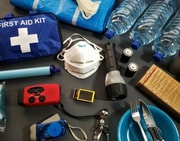Is your neighborhood at risk? See the dementia hotspots you need to know about!
- Replies 0
You may not think about your zip code when it comes to your brain health.
But a new study suggests that where you live could play a surprising role in your risk of dementia.
Millions of Americans are already affected, and that number is only expected to rise.
Could your neighborhood be putting you at greater risk?
Around 8 million adults in the US are currently living with dementia. Each year, about 500,000 new cases are diagnosed. Experts estimate cases will grow by 1 million per year by 2060. Alzheimer's disease is the most common form, accounting for approximately 6 million of those cases.
The new study, published in JAMA Neurology, looked at 1.2 million veterans over age 65. Participants were followed for an average of 13 years.
The Mid-Atlantic—Delaware, Washington DC, Maryland, Pennsylvania, Virginia, West Virginia, New Jersey—was used as a baseline because it had the lowest dementia rate of 11 per 1,000 people. From there, regional risk increases were calculated.

“Quality of education, early life conditions, and environmental exposures may be among those factors,” said Dr. Christina Dintica, first author and postdoctoral scholar at UCSF.
Areas with more industrial activity and higher pollution tend to have worse outcomes. Poor access to healthcare may delay diagnoses and increase risks. States with high rates of obesity, diabetes, and heart disease saw higher dementia rates.
Also read: Discover the secret to better health that you have but haven’t been using enough!
This could be due to cases being underreported, a growing aging population, and surging rates of diseases like heart disease and obesity, according to the study.
These chronic conditions harm blood vessels and trigger brain inflammation. Over time, this damage can lead to cognitive decline. The study focused exclusively on US military veterans, a group with specific exposures.
Some TBIs may also increase amounts of tau and amyloid proteins in the brain, which are known to cause Alzheimer’s disease.
Also read: Are you ignoring this common leg issue? It could secretly raise your dementia risk by 25%
PTSD is also linked to inflammation and brain structure damage. Agent Orange exposure from the Vietnam War doubles the risk of developing dementia. Fortunately, there are proven ways to protect brain health regardless of geography.
Staying physically active, eating a Mediterranean-style diet, and lifelong learning all help.
Managing blood pressure, blood sugar, and cholesterol is critical. Avoiding toxins and air pollution when possible is also beneficial. Moving to a lower-risk region isn’t a guaranteed solution. Personal health habits and family history play an even bigger role.
“The study underscores the need to understand regional differences in dementia and the importance of region-specific prevention and intervention efforts,” said Dr. Kristine Yaffe, senior author. If you're relocating for retirement or family, consider healthcare quality and environmental conditions.
Read next: Discover how I found a renewed purpose at 60 by becoming a dementia “Hummingbird”—and how you can too!

How much does your zip code influence your brain health—and could living in certain regions actually increase your risk of dementia? Explore the findings, see how your area compares, and share your thoughts down below—have you noticed regional differences in brain health or taken steps to reduce your own risk?
But a new study suggests that where you live could play a surprising role in your risk of dementia.
Millions of Americans are already affected, and that number is only expected to rise.
Could your neighborhood be putting you at greater risk?
Around 8 million adults in the US are currently living with dementia. Each year, about 500,000 new cases are diagnosed. Experts estimate cases will grow by 1 million per year by 2060. Alzheimer's disease is the most common form, accounting for approximately 6 million of those cases.
The new study, published in JAMA Neurology, looked at 1.2 million veterans over age 65. Participants were followed for an average of 13 years.
The Mid-Atlantic—Delaware, Washington DC, Maryland, Pennsylvania, Virginia, West Virginia, New Jersey—was used as a baseline because it had the lowest dementia rate of 11 per 1,000 people. From there, regional risk increases were calculated.

Around 8 million adults in the US are currently living with dementia. Each year, about 500,000 new cases are diagnosed. Image Source: Steven HWG / Unsplash
- Southeast (e.g., Kentucky, Mississippi): 14 cases per 1,000—a 25% increase over the Mid-Atlantic.
- Northwest & Rocky Mountains (e.g., Alaska, Montana, Colorado): 13 cases per 1,000—23% increased risk.
- Southwest (e.g., Arizona, California, Nevada): 12 cases per 1,000—13% increased risk.
- Northeast (e.g., New York): 12 cases per 1,000—7% increase, the smallest rise.
“Quality of education, early life conditions, and environmental exposures may be among those factors,” said Dr. Christina Dintica, first author and postdoctoral scholar at UCSF.
Areas with more industrial activity and higher pollution tend to have worse outcomes. Poor access to healthcare may delay diagnoses and increase risks. States with high rates of obesity, diabetes, and heart disease saw higher dementia rates.
Also read: Discover the secret to better health that you have but haven’t been using enough!
This could be due to cases being underreported, a growing aging population, and surging rates of diseases like heart disease and obesity, according to the study.
These chronic conditions harm blood vessels and trigger brain inflammation. Over time, this damage can lead to cognitive decline. The study focused exclusively on US military veterans, a group with specific exposures.
Some TBIs may also increase amounts of tau and amyloid proteins in the brain, which are known to cause Alzheimer’s disease.
Also read: Are you ignoring this common leg issue? It could secretly raise your dementia risk by 25%
PTSD is also linked to inflammation and brain structure damage. Agent Orange exposure from the Vietnam War doubles the risk of developing dementia. Fortunately, there are proven ways to protect brain health regardless of geography.
Staying physically active, eating a Mediterranean-style diet, and lifelong learning all help.
Managing blood pressure, blood sugar, and cholesterol is critical. Avoiding toxins and air pollution when possible is also beneficial. Moving to a lower-risk region isn’t a guaranteed solution. Personal health habits and family history play an even bigger role.
“The study underscores the need to understand regional differences in dementia and the importance of region-specific prevention and intervention efforts,” said Dr. Kristine Yaffe, senior author. If you're relocating for retirement or family, consider healthcare quality and environmental conditions.
Read next: Discover how I found a renewed purpose at 60 by becoming a dementia “Hummingbird”—and how you can too!
Key Takeaways
- A new UCSF study has revealed large geographic differences in dementia rates, with the Southeast having the highest and the Mid-Atlantic the lowest.
- Factors like poor education, air pollution, and chronic diseases may be behind these disparities.
- Veterans are at especially high risk due to TBIs, PTSD, and Agent Orange exposure.
- US dementia cases are projected to grow by 1 million per year by 2060.






